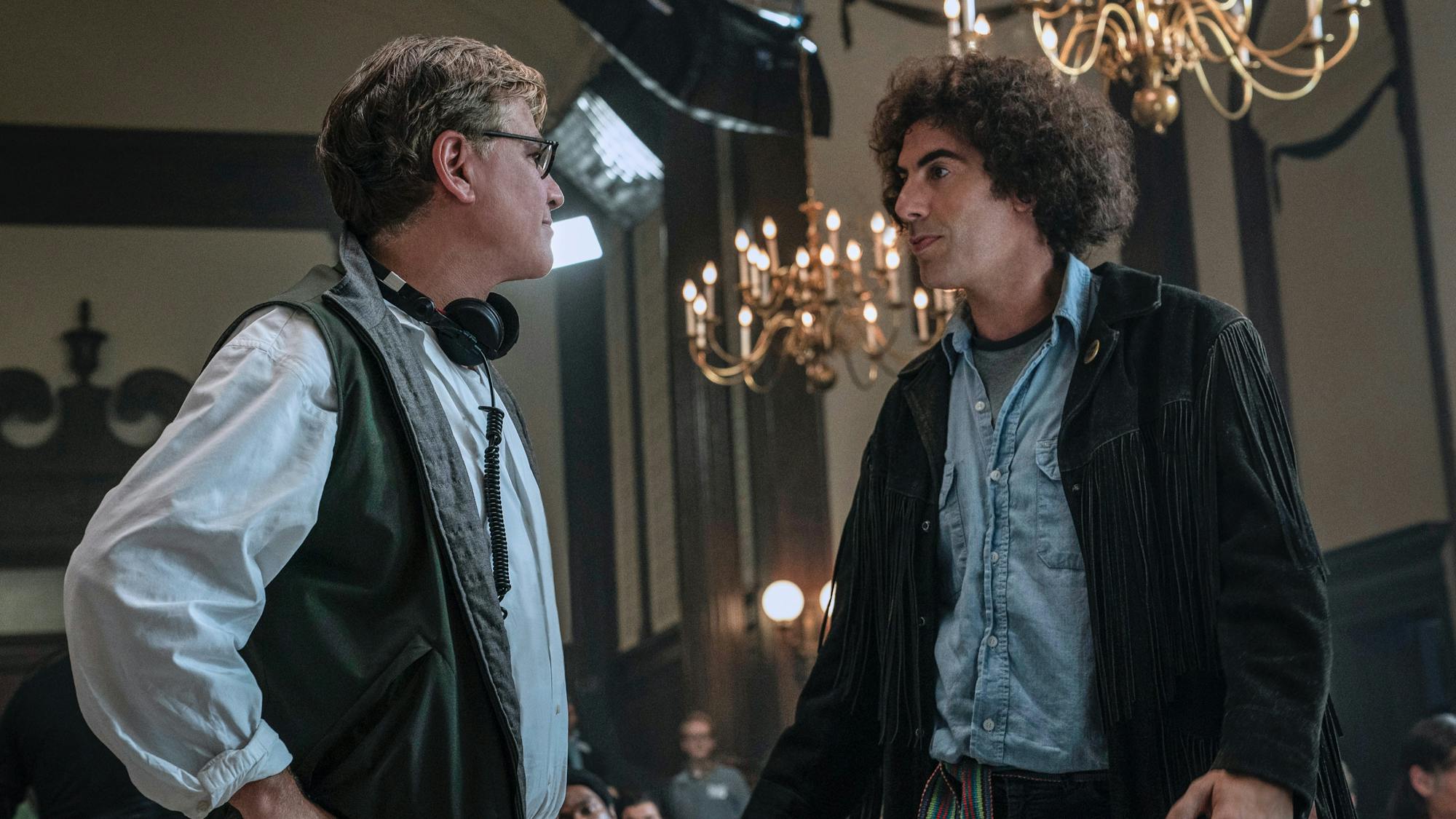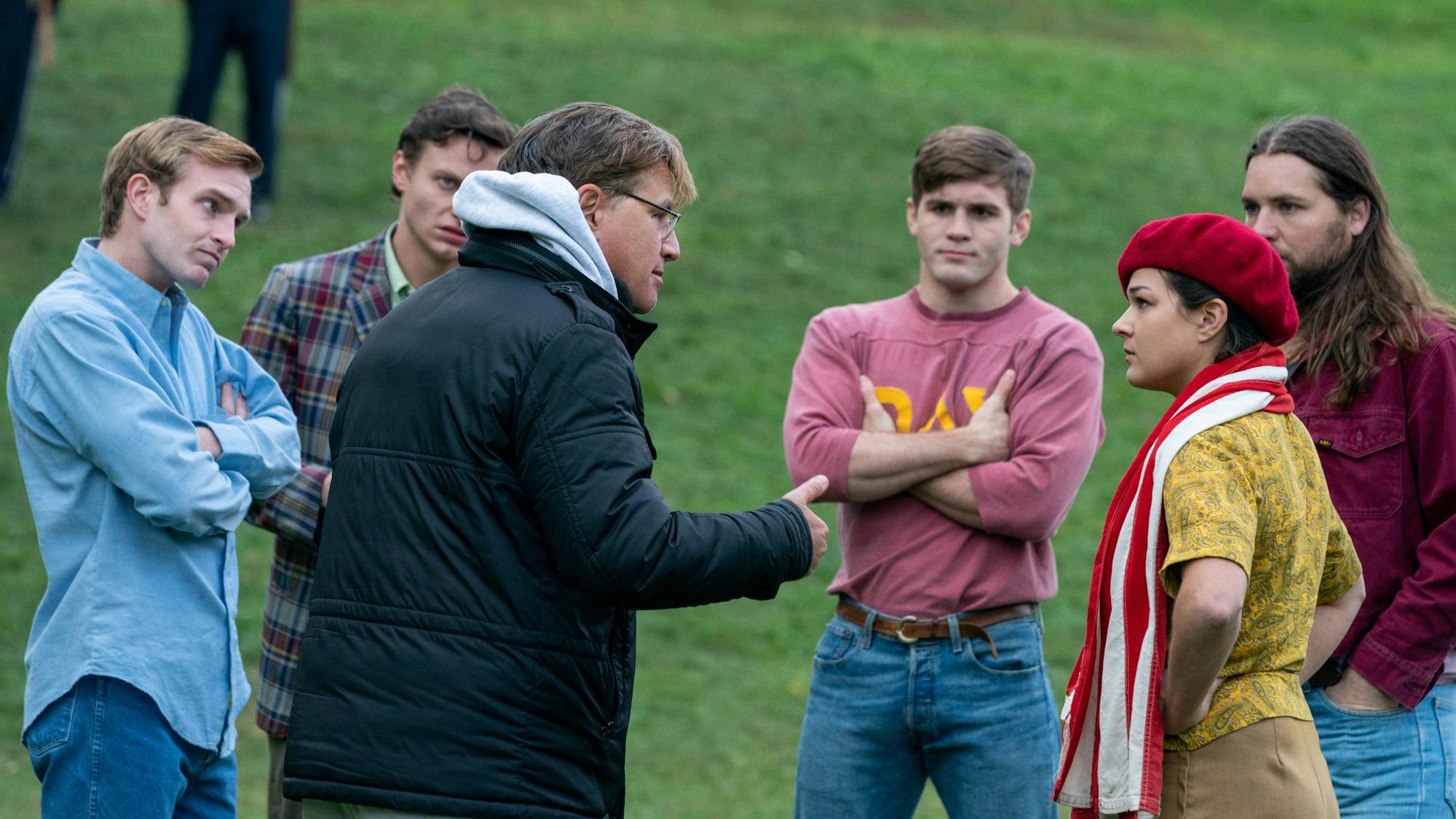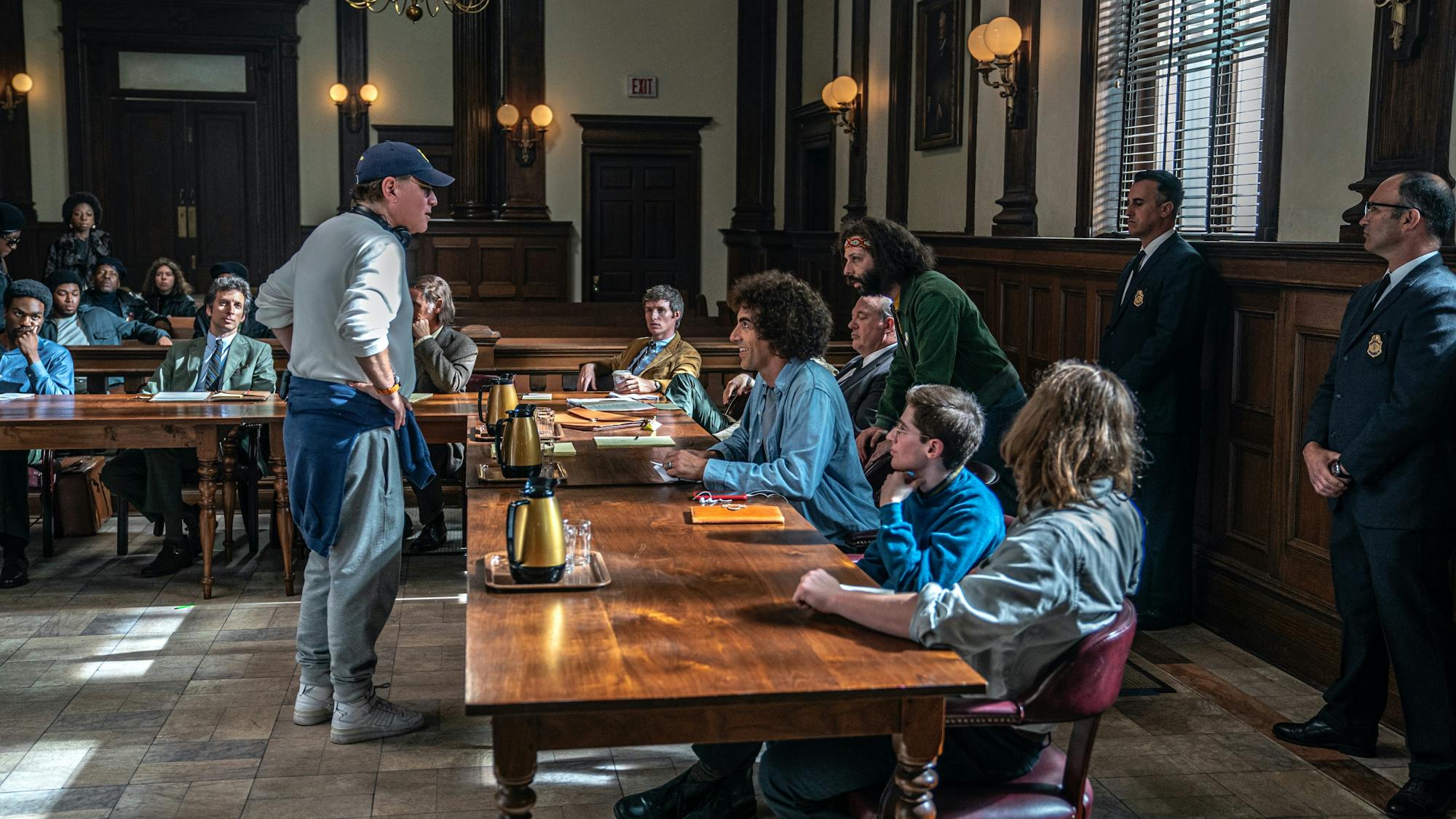Aaron Sorkin talks The Trial of the Chicago 7, the origins of his career, and the kinds of stories he likes best.
Hollywood would be a very different place if Aaron Sorkin had decided to pursue his earliest show business dreams. Taken with the stage since childhood, he long harbored notions of becoming a performer, maybe even a song-and-dance man on Broadway. By the time he realized that acting might not be his calling, he’d already begun flirting with life as a different sort of storyteller.
“I wrote a one-act play, submitted it to a one-act play festival, and it was accepted,” Sorkin recalls. “I cast myself opposite Nathan Lane. I was onstage one night doing the play, and with my playwright’s eyes I was just watching Nathan, saying, This guy is great. Wouldn’t it be great if all the actors in my play were as good as Nathan? That was the last time I acted.
”Sorkin, of course, became one of the most lauded writers in contemporary film, television, and theater, known for the indelible rhythms of his impeccably scripted dialogue. His work is sophisticated, substantial. He tells stories for adults, about adults who find themselves in the throes of obsession or in the grips of crisis. The Trial of the Chicago 7, which he both wrote and directed, is no exception.
Starring Eddie Redmayne and Sacha Baron Cohen as real-life antiwar activists Tom Hayden and Abbie Hoffman, the drama centers on the legal battle that arose in the wake of the 1968 protests at the Democratic National Convention in Chicago. It’s the sort of terrain that Sorkin likes best: a tale rooted in American history, about clashing ideals and outsized personalities willing to give their lives for a cause.

Aaron Sorkin directs Sacha Baron Cohen in The Trial of the Chicago 7
Queue’s Krista Smith spoke with Sorkin for her podcast Present Company.
Krista Smith: You are a master at stories about American ideals and institutions and ambitions. What is it about an idea or a character that gets you hooked? How do you know when you have something?
Aaron Sorkin: I worship at the altar of intention and obstacle. Somebody wants something, something’s standing in the way of getting it. They want the money, they want the girl, they want to get to Philadelphia. It doesn’t matter, but they want it. It’s even better if they need it. And the obstacle has to be formidable. Where I’ll really get hooked is if a character has to sacrifice, to risk something, like popularity. They have to risk something to do the right thing. I enjoy writing about that.
Your dialogue is legend. It made so much sense to me when I found out you’re a musical person. Your monologues could be set to music. And on set, you want your words spoken as they are written.
AS: I do. That doesn’t mean that I’m unwilling during rehearsal to hear you out if you’re telling me that you’re having trouble getting this line out of your mouth or this transition is hard for you. I’m open to hearing that. I do rewrite, but there’s no improvisation or ad-libbing or playing fast and loose. Look, I love dialogue. I was taken to musicals starting from when I was very young, but I was also taken to plays — oftentimes plays that I was either too young or too dumb to understand, like Who’s Afraid of Virginia Woolf? when I was 9 years old. That kind of thing. Oftentimes, I didn’t really understand what was going on, but I loved the sound of dialogue. It sounded like music to me. When I started writing, I wanted to imitate that sound. What a line of dialogue sounds like is as important to me as what it means. Dialogue is the most personal part of writing.
It was Friday night. I didn’t have $3 in my pocket...
Aaron Sorkin
You originally wanted to be an actor. Talk to me about that moment when you finally put a piece of paper in that typewriter and decided, This is it.
AS: There was an exact Friday night when it happened. I went to college to study theater. I got a B.F.A. in musical theater from Syracuse University. After graduation, I came to New York, and I was living in my ex-girlfriend’s studio apartment. For $250 a month, I got to pull a futon out of her closet and sleep on the floor. There was a friend of mine from high school who had just moved to New York, who was trying to make his way as a journalist. He had with him his grandfather’s semi-automatic typewriter, a typewriter with electric keys and a manual return. He was going out of town for the weekend with his girlfriend and he didn’t want to schlep it with him, so he asked me if I would hang on to this typewriter for him.
It was Friday night. I didn’t have $3 in my pocket. I think it was probably raining outside. And for some reason nothing in the apartment was working. The TV wasn’t working. The stereo wasn’t working. The only possible source of entertainment in this apartment was that typewriter, if I stuck a piece of paper in it. I did, and for the first time in my life started writing for pleasure instead of as a chore to be gotten through for a school assignment. I ended up staying up all night writing. I feel like that night never ended, like I’m still in that night. In the morning, I called a couple of friends and I asked them to come over and read these pages out loud for me. My two friends were really encouraging. If they hadn’t been, I probably never would have written anything after that night.
Did anything ever happen with the original thing you wrote that Friday night? Did you turn that into anything?
AS: Well, what happened with it was a lawsuit, actually. A producer came along and optioned the play for Broadway, and then another producer came along and claimed that they had the right to option it, not the original producer. The thing got hung up. You can imagine, I’m facing an opportunity — are you kidding me? To have a Broadway production of this play and it’s not going to happen because there’s a lawsuit? It was incredible to me. But looking back I’m very grateful that happened, because that play was no good.

Aaron Sorkin prepares extras for a protest scene in The Trial of the Chicago 7
You can say that now, years later, but I imagine at the time...
AS: No, I promise you. It was every playwright’s first play. I would say that it’s in my drawer, but I won’t even let it in my drawer.
With all your success, what still makes you vulnerable?
AS: A man who had a tremendous influence over me and my writing and my career is William Goldman, who passed away a couple of years ago. Bill Goldman is a two-time Oscar winner for All the President’s Men and Butch Cassidy and the Sundance Kid. I was at his apartment one time — he lived at the Carlyle Hotel. He had just finished a draft of Misery and was very nervous about it. He had no ideas for the next thing. He was just talking about how this is the time he’s going to get found out as a fraud. He’s saying this, and not six feet away from him are two Academy Awards. I just thought: If Bill Goldman is feeling like this now, at this point in his career, what possible hope is there for any of us? What hope is there for me?
So, you asked me what makes me still feel vulnerable? I don’t feel one inch less vulnerable than I did the morning I asked my two friends to come over and read the pages that I wrote in the typewriter. I would say I’m exactly as vulnerable as I’ve always been.
I love those four walls.
Aaron Sorkin
It’s funny how that never leaves. I’ve found that with the talented people I’ve been around in my career, it is something that is true for every single one of them.
AS: I don’t know, maybe you need that as a motivator. I feel like I could be plenty motivated without it. I wouldn’t mind not feeling the anxiety. But again, when I think about it, you should feel anxiety. It’s a big deal. You made a movie. You’re asking people to come see it. It should be important enough that it makes you nervous.
Your dad was a lawyer, your sister’s a lawyer, your brother was a lawyer, and you love a courtroom drama. A Few Good Men, which you wrote as a play, was optioned as a movie before the curtain even went up, right?
AS: Listen, obviously I have love for A Few Good Men. For someone like me, having a play on Broadway, you just can’t imagine what that feels like. And the people in the play all became very close friends of mine and still are today. The experience of doing the movie — this was a movie with Tom Cruise, Jack Nicholson, Demi Moore, Kevin Bacon, Kiefer Sutherland, and J.T. Walsh; Rob Reiner was a very hot director at the time — it was extraordinary. But any time I’ve been approached about a revival of the play on Broadway or some kind of major production of the play, I’ve declined, and it’s because I look at A Few Good Men the way I look at my high school yearbook picture. I would give anything to have A Few Good Men back and write it over again. Writers get better when they get older, like symphony conductors, not like athletes. I would just love to have that one back.
That’s interesting. It’s such a seminal moment in your career. People still recite those lines: “You can’t handle the truth!”
AS: I know. Believe me, at 2 a.m. when I was writing that scene and that line, I never imagined that it would become something that people say. I’m sure Nicholson had a lot to do with that.

Aaron Sorkin directs a courtroom scene in The Trial of the Chicago 7
The Trial of the Chicago 7: Clearly, you still love a courtroom.
AS: I love those four walls. Watch as I compare myself to an adorable animal: They say that when you bring home a new puppy, you should get a crate that’s just big enough for the puppy to be able to turn around in, but no bigger, because they really like the comfort of that tight space, of those four walls. I’m the same way. That’s why practically everything I write is people talking in offices. If it can be a courtroom, that’s best because the intention and the obstacle are clear. The jury is a stand-in for the audience; they know as little as the audience does. The stakes are so high. There’s a scoreboard. I love being in a courtroom. Being outside in a giant park and staging a riot? That’s terrifying. Not even staging it, just writing the three letters “E – X – T” — which means exterior — I start to shake.
What was your favorite part about shooting those riots for the film?
AS: It was three weeks that we were shooting those riots. We were in Grant Park, which is right off of Lake Michigan. I learned when I was in Chicago that it’s called the Windy City because Chicago politicians were famous for talking a lot. It is, however, a very windy city, especially right next to Lake Michigan. So we’re shooting those scenes at night, and what I remember was a great spirit even among the several hundred extras who were dressed as if it was August 28th, one of the hottest nights of the summer, on this cold night in October. Everyone’s spirits were really high. Everybody seemed to be happy that we were there.
These projects that you’re famous for — Sports Night, The West Wing, Studio 60 on the Sunset Strip — how does it feel to know your work has had such a profound influence on people?
AS: I can’t describe how it makes me feel. It’s an extraordinary privilege when somebody tells me that I had some kind of influence over their wanting to be a writer. Sometimes someone who works in public service, someone who works in government, will tell me that The West Wing made them a poli-sci major and this is what they’re doing now. It’s an extraordinary privilege to be able to feel that way. And you’re reminded that the most powerful delivery system ever invented for an idea is a story.